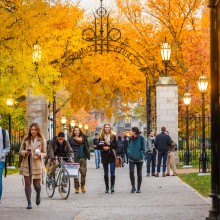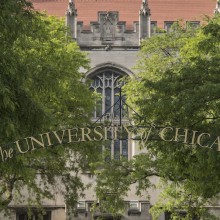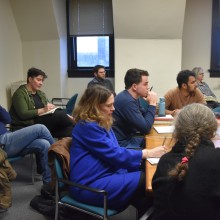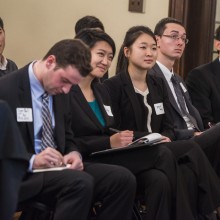Ivanna initially pursued an LLSO major because she felt the program meaningfully augmented her Political Science degree with a different perspective. The flexibility of the major and its overlap with other social science disciplines gave Ivanna the range to explore issues she cared about, even if they were peripheral to her main academic focus. She recommends the LLSO major to prospective students as a way of learning a new mode of thinking, reflecting, “Each class I took added to my general understanding of the world…and the beauty of Law, Letters, and Society is that, in your thesis, you can write about almost anything.”
Ivanna came up with her project through her work as a research assistant for Professor Austin Carson. After taking his class “The Secret Side of International Politics,” she applied to an RA opening for his project called the President Daily Brief Project, which studied papers from an archive of declassified presidential intelligence briefings. In her free time, Ivanna started investigating the archive more and began to notice discrepancies in briefings from the same day. Specifically, the briefings that intelligence analysts compiled for the president sounded significantly more confident than the reports sent to other analysts.
One of the most exciting moments in the thesis writing process occurred after Ivanna finished the long process of quantitatively and qualitatively formalizing her findings. When she analyzed her data, Ivanna found that her results corroborated her theory that intelligence analysts varied their language depending on the recipient of their reports.
Looking back on her project, Ivanna has several pieces of valuable advice for those writing theses. First, she says, “It helps so much to have a topic you genuinely care about. If you have a project that makes you want to pick up your computer when you’re done with work for the day, that’s a winner.” Second, she highly recommends having a mentor, ideally a professor. For example, her mentor, Professor Carson, guided her throughout the process of writing a literature review and gave her direction in choosing which resources to utilize. In particular, Ivanna believes that choosing a mentor with similar academic interests was crucial to her success. Third, Ivanna notes that taking a class with a long paper requirement (such as “The Secret Side of International Politics”) gave her important practice for writing her thesis.
Ivanna wants to shout out her mentor Professor Austin Carson for his invaluable expertise and mentorship as well as her preceptor Anjali Mohan for all of her support and advice.
Finally, Ivanna is grateful to Professor Carson for encouraging her to send her research to other competitions. For her research, Ivanna also won the 2021 Inman Award, a national contest for scholarship on intelligence topics. Next year, she plans to pursue a master’s degree.
Zachary is a current third-year majoring in Law, Letters, and Society and Political Science. Zach describes the LLSO program as “a unique opportunity to pursue niche interests in great depth, tailoring my studies to best prepare me for a future career in election law.” Indeed, in response to the 2021 Charles Wegner Essay Competition Prize’s theme of voting rights, Zach seized the chance to explore his academic interests in populist currents and “election integrity” laws.
When asked about the process of crystallizing his argument, Zach recalls a particular moment that motivated one of his paper’s driving questions. He relays:
There’s an image I can’t get out of my head: On January 6, 2021, outside the U.S. Capitol, someone was carrying a flag with “We the People” emblazoned on it. How can an attempt to thwart the constitutional mechanism designed to ratify the result of a democratic election be rationalized as an effort to “save” America, to save democracy?
Suspecting that the same question could be asked of election integrity laws, many of which were introduced after the 2020 election, and inspired by the subsequent readings he undertook, Zach began to pursue answers to his inquiry. It was then that he realized that “[d]oubt provides an opportunity for individuals’ biases to manifest, and demagogues can capitalize this to their advantage. It allows legislators to present solutions (that work to their benefit) to manufactured or overblown problems.”
In fact, one of the most exciting aspects of the writing process for Zach was understanding the role of doubt in his argument and its importance in answering his original question. Zach adds that his research process ultimately pushed him to engage more deeply with political misinformation studies, and he remains excited about the ways in which this essay competition experience will benefit him in his future undergraduate, graduate, and professional work.
He also has invaluable advice to impart to other students looking to submit their work to competitions. For example, Zach recommends a multidisciplinary approach to start, complemented by reading and interrogating various perspectives and ideas in the academic literature. He highlights the necessity of re-writing and of perseverance, as well as the importance of soliciting second opinions and feedback from others. Finally, Zach says, “Most importantly is to try—regardless of how the competition turns out, the research and writing processes alone will refine your thinking about the topic, and you’ll be a better writer because of it.”
Zach would like to shout out Professor Daragh Grant and Professor David Lebow for their guidance.
Ultimately, Zach says, “The combination of its [LLSO’s] flexibility, the stellar courses listed with the program, and the strong background in the academic study of law that it provides has proved invaluable to me.” We can’t wait to see what comes next for Zach!
Rachel describes her first year in the LLSO major as “phenomenal” and still enjoys memories of exploring the program and taking some of her favorite classes. She now calls herself a “really huge fan of LLSO” and encourages anyone and everyone to apply.
After her first year, Rachel applied for the LLSO Student Assistant position. Because the program had only recently been restarted at the time, Rachel was able to be involved in crucial initiatives, such as developing the Student Board and building the UChicago LLSO website. She also spent a lot of time advertising classes and events, and she says that much of her work consisted of enhancing and refining the details of other people’s ideas. For example, once Professor Levy introduced the idea of forming a Student Board, Rachel led Q&A sessions about the joining the group, distributed meeting minutes to Board members, and encouraged current majors to apply. Additionally, Rachel particularly enjoyed creating the internal Facebook group for those in the major, where students can communicate about advice, classes, and more.
Rachel comments that her favorite part of being in a leadership position in LLSO was “being around to answer people’s questions. I love when people randomly message me and ask for advice!” Anyone who knows Rachel realizes that, indeed, she deeply invests in the success of other students and is always eager to be a resource for those around her. She says that her leadership style focused on being friendly, doing what she could to be helpful, and trying to ensure that every student had a voice in the major. Rachel succeeded in spades.
She recalls that one of her favorite moments in the LLSO program was her first Student Board meeting. She was impressed with the vibrant discussion among “all those people with so many diverse perspectives on how to guide the major. Hearing from students is an essential part of improving.” Indeed, in reflecting on her leadership journey, Rachel says that one of the most important aspects of her time in LLSO was being able to connect with so many different people in the major. Giving back to the community, Rachel remarks, was incredibly valuable to her. She advises future LLSO students and leaders to “be proactive and see where you can help. If there’s something you want to do, ask to do it!”
Finally, Rachel wants to credit Atiya Singh, the LLSO Program Administrator, with being particularly formative in her time as a leader in LLSO. After working closely with Atiya as the Student Assistant, Rachel acknowledges, “Law, Letters, and Society would not be anything near where it is without her incredible work.”
Rachel is currently living in Washington, D.C. and interning on the Hill.



